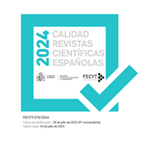Perfecto, antiperfecto, evidencial y admirativo: Decir un evento para comunicar dos
Resumen
Desde la lingüística histórica, la tipológica y la de contacto, se han destacado las relaciones existentes entre las categorías de perfecto, evidencial y admirativo. En el presente trabajo, proponemos que estas relaciones se fundan en una base semántico-pragmática común a las tres, compartida también con la de antiperfecto. En todas ellas, junto con explicitar una eventualidad se introduce en el discurso otra, estrechamente vinculada al hablante. Este valor común está a la base de la subjetividad y el componente epistémico que típicamente presentan las categorías en estudio. La propuesta se ilustra con casos del español, el mapudungun, el español en contacto con lenguas indígenas y otras lenguas no relacionadas.Descargas
Descarga artículo
Licencia
La revista Círculo de Lingüística Aplicada a la Comunicación, para fomentar el intercambio global del conocimiento, facilita el acceso sin restricciones a sus contenidos desde el momento de su publicación en la presente edición electrónica, y por eso es una revista de acceso abierto. Los originales publicados en esta revista son propiedad de la Universidad Complutense de Madrid y es obligatorio citar su procedencia en cualquier reproducción total o parcial. Todos los contenidos se distribuyen bajo una licencia de uso y distribución Creative Commons Reconocimiento 4.0 (CC BY 4.0). Esta circunstancia ha de hacerse constar expresamente de esta forma cuando sea necesario. Puede consultar la versión informativa y el texto legal de la licencia.











